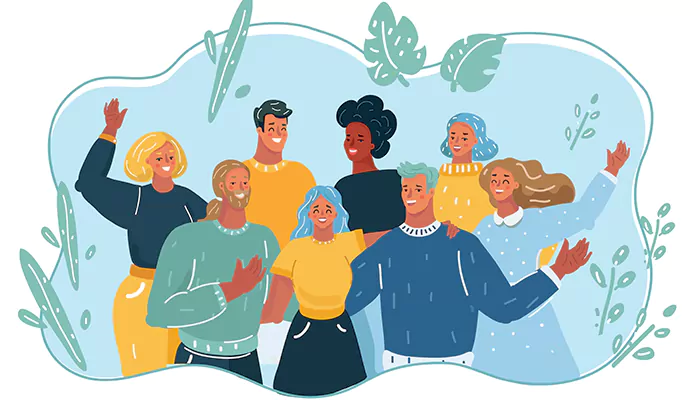Why Laughter Have the Remarkable Ability to Infectiously Spread from Person to Person
- Admin
- 1 year ago
- 4 minutes read

Intro: Let's delve into the fascinating psychology behind this phenomenon.
Laughter is a universal language, transcending barriers of culture, language, and distance. It possesses a remarkable ability to spread from person to person, creating an infectious atmosphere of joy and camaraderie. But what exactly makes laughter so contagious?
The Science Behind Laughter Contagion: At its core, laughter contagion is a complex interplay of social, psychological, and neurological factors. Studies have shown that laughter activates multiple regions of the brain, including the prefrontal cortex, the limbic system, and the motor cortex. When we hear laughter, our brain automatically interprets it as a positive social cue, triggering a cascade of neural responses that compel us to join in.
Mirror Neurons and Empathy: One key mechanism behind laughter contagion is the activation of mirror neurons. These specialized brain cells fire not only when we perform an action but also when we observe someone else performing the same action. When we witness someone laughing, our mirror neurons fire, simulating the experience of laughter within ourselves. This phenomenon enhances our capacity for empathy, allowing us to share in the emotional experiences of others and connect on a deeper level.
Social Bonding and Group Dynamics: Laughter serves as a potent tool for social bonding, fostering a sense of unity and belonging within groups. Shared laughter strengthens interpersonal connections, builds trust, and alleviates social tension. In group settings, contagious laughter can spread rapidly, creating a feedback loop of positivity and reinforcing social cohesion. It's no wonder that laughter is often described as contagious—it's nature's way of bringing people together.
The Role of Emotional Contagion: Emotions, including laughter, can spread through a process known as emotional contagion. When we observe someone experiencing a particular emotion, such as joy or amusement, we tend to mirror that emotion ourselves. This phenomenon is especially pronounced with laughter, as it elicits such a visceral and immediate response. Whether through genuine amusement or polite chuckles, we often find ourselves laughing along with others without consciously realizing it.

Cultural Influences on Laughter: While laughter is a universal phenomenon, its expression and interpretation can vary across different cultures. Cultural norms, values, and social contexts shape how laughter is perceived and utilized within a given society. Some cultures may emphasize laughter as a means of bonding and communication, while others may view it as inappropriate or disrespectful in certain situations. Despite these variations, the underlying mechanisms of laughter contagion remain consistent across cultures, highlighting its innate human nature.
The Power of Shared Experience: Laughter is not only contagious but also contagious in its own right. When we share moments of laughter with others, we create lasting memories and strengthen interpersonal bonds. These shared experiences become cherished anecdotes that we revisit time and again, reinforcing our connections with those around us. Whether it's a spontaneous burst of laughter with friends or a heartfelt chuckle shared with loved ones, these moments enrich our lives and remind us of the joy inherent in human interaction.
Harnessing the Benefits of Laughter: Understanding the contagious nature of laughter can have profound implications for personal well-being and social interaction. Incorporating laughter into our daily lives can reduce stress, enhance mood, and improve overall health and resilience. By seeking out opportunities for laughter and cultivating a positive atmosphere, we can cultivate stronger relationships, boost morale, and create a more vibrant and connected community.
Laughter is indeed contagious, spreading joy and camaraderie wherever it goes. Through a combination of neurological responses, social dynamics, and shared experiences, laughter transcends barriers and brings people together in a celebration of the human spirit. So, the next time you find yourself in the presence of laughter, don't resist—embrace it wholeheartedly and let its infectious charm uplift your spirits.












